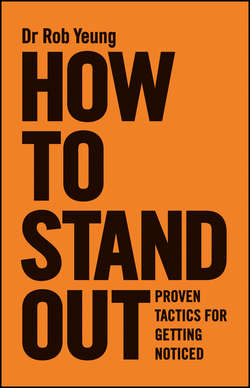Читать книгу How to Stand Out - Yeung Rob - Страница 6
На сайте Литреса книга снята с продажи.
Introduction
ОглавлениеWhen you do the common things in life in an uncommon way, you will command the attention of the world.
George Washington Carver
What is it that helps some people stand out? What helps certain individuals get picked out of the crowd – to attract attention and get noticed at work, at a party, in life?
I’m not talking about metaphorical crowds either. How do people stand out when they are in a literal crowd, say a room full of people at a networking event all clamouring for attention?
These were the kinds of questions I was looking to answer when I went to a networking breakfast one sunny but unexpectedly cold spring morning in west London. The venue: Lala Brasserie, a glass-fronted Mediterranean restaurant by a busy intersection. I’d been told by one of the organizers that the regular meeting began at 6.45 a.m. However, when I turned up exactly on time, I was confronted by the bustle and noise of a room thronged with scores of people already deep in conversation. It turned out that, such was the desire to get talking and do deals, most people turned up at 6.30 a.m. Being almost one of the last to arrive, I had some catching up to do.
In quick succession, I met one person after the next. Marvin ran a company offering bookkeeping services. Zane was an employment lawyer. Serena, a designer of bespoke jewellery. There was Anastacia, who worked in foreign exchange. Thayne, an electrician. I met so many people that the names and faces began to blur.
At around 7.15 a.m. came the opportunity for everyone to address the whole room. The chairperson of the meeting – a strong-featured Irish woman with her hair pulled away from her face in a business-like manner – called for our attention. In a strident voice, she invited us to tell the room individually what we did and what we were looking for. It was our opportunity to pitch ourselves.
To keep the introductions moving swiftly, someone at the back of the room must have been sitting with a timer. A bell rang every 50 seconds – not even a full minute! – to keep people from hogging airtime.
There was a financial adviser, a landscape gardener, a virtual personal assistant, the owner of a firm of commercial cleaners. Graphic and Web designers, a guy who did something with email, a physiotherapist, a commercial property expert.
Twenty people had spoken but that wasn’t even half of the people in the room. I was trying my best to pay attention but most of it simply wasn’t sticking. Was Jacinta the therapist or was she something to do with charities? Who was the tall guy with curly grey hair and the glasses again? Yet still they came. More: an architect, several different kinds of lawyer, a telemarketer and a self-described “business growth engineer”. For the most part, I couldn’t keep track.
Many spoke too quietly to be heard in front of the 50-strong audience. A few read from scraps of paper in monotone voices without looking at the increasingly bored faces around them. Yet a few stood out.
A man with a lined face and a gravelly but sincere voice called Merik started with what the audience immediately realized were lyrics from a song: “I believe the children are our future. Teach them well and let them lead the way.” He paused dramatically and then said, “You know the rest.”
And of course we did. By quoting the opening lines to the well-known Whitney Houston song The Greatest Love, he had struck a chord with most of us and made himself instantly memorable.
He went on to say that he believed that children are the future. And that children in schools needed clean windows to be able to see properly, concentrate properly, study properly. So he asked if anyone knew of any schools that needed their windows cleaning. It was a quirky, unusual pitch for his commercial window cleaning business. And for that reason it stood out like a lighthouse on a foggy night.
Another of the small handful that stood out: Luke, a ballsy estate agent in his twenties – he looked and sounded like he could play the cheeky-but-lovable rogue on any British soap opera. He told the room how he had valued the houses of a couple of older women recently. He estimated that they could sell their houses for in excess of £1.2 million. But they had bought their houses years and years ago for around £8,000. The implication: on selling up, these women would become instant cash millionaires.
Luke joked that he didn’t know if his insurance covered him should he give an elderly lady a heart attack and the throng laughed warmly for perhaps the first time that morning. Again, he managed to distinguish himself from the crowd.
